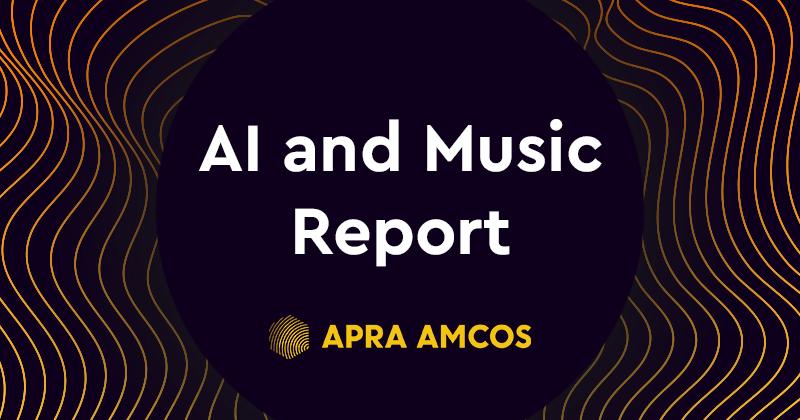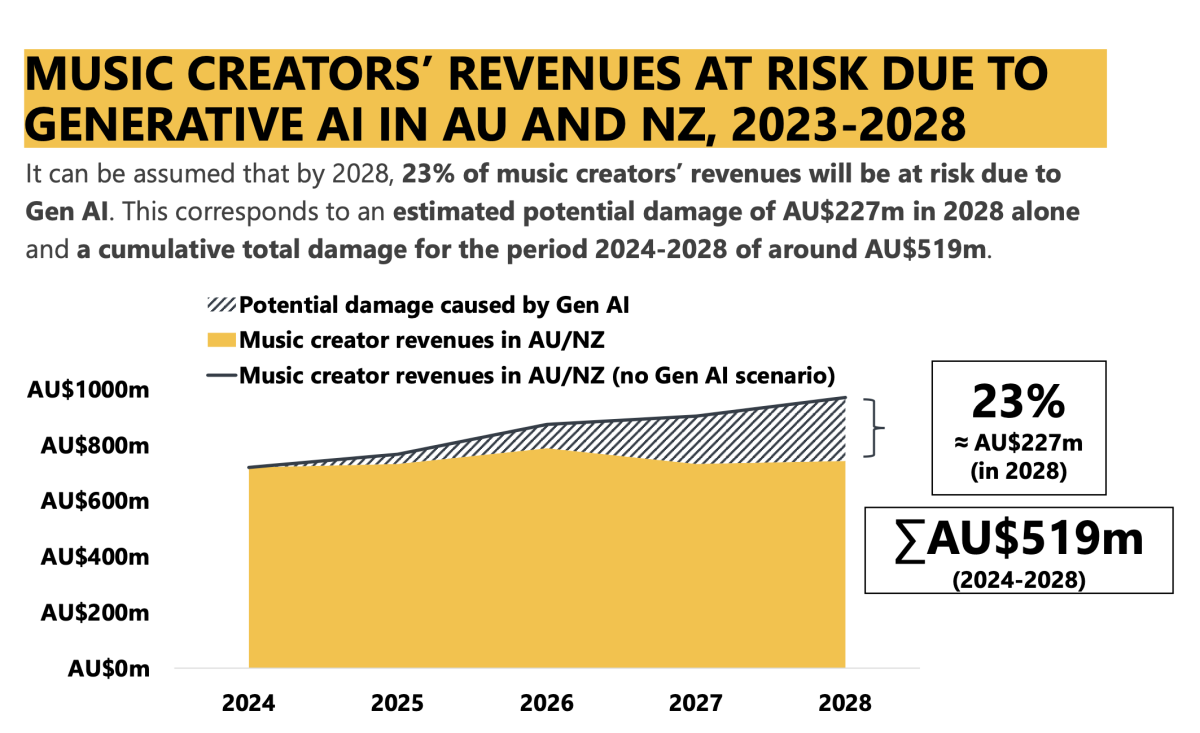
Largest report on AI in music reveals potentially devastating impact for Australian and New Zealand music creators
- Revenue risk: By 2028, 23% of music creators’ revenues will be at risk due to generative AI, an estimated cumulative total damage of half a billion (AUD$519m)
AI adoption: Over half (54%) of those surveyed agree that AI technology can assist the human creative process. AU/NZ songwriters and composers are early adopters - Income impact: 82% of music creators are concerned that the use of AI in music could lead to them no longer being able to make a living from their work
- Cultural concerns: 89% of Aboriginal and Torres Strait Island music creators believe that AI will lead to an increase in cultural appropriation
- Policy demands: 97% demand that policymakers should pay more attention to the challenges related to AI and copyright
In the largest study of its kind in the region, music rights organisation, APRA AMCOS, has unveiled the results of its exhaustive report into AI in the music sector – AI and Music* – revealing the technology’s potentially devastating impact on Australian and New Zealand music creators.
Conducted by Berlin-based consultation and research group, Goldmedia GmbH, the report is based on survey responses from over 4,200 APRA AMCOS members across Australia, New Zealand and overseas in May and June this year, including songwriters, composers and music publishers.
Economic projections were calculated about the potential impact on the industry, and a range of industry experts and academics interviewed including Associate Professor Oliver Bown (UNSW), Dr Sam Whiting (RMIT), Sophie Burbery (University of Auckland), Tracy Chan (Splash), Sally Coleman (Big Sand), and songwriter and producer, Tushar Apte.
Leading industry figures have also lent their voices to the report, including Bernard Fanning, Caitlin Yeo, Clare Bowditch, Jimmy Barnes, Julian Hamilton, Kate Miller-Heidke, Kingdon Chapple-Wilson, Michelle Levings aka GLVES, Missy Higgins, Nigel Westlake, Peter Garrett and Tina Arena.

Key findings
The report’s economic findings are startling, showing that by 2028, 23% of music creators’ revenues will be at risk due to generative AI, an estimated cumulative total damage of over half a billion dollars (AUD$519 million). To date, there is no remuneration system that closes the AI-generated financial gap for music creators.
Of those surveyed, many are already using AI to assist with music creation, with 38% already using AI in their work and over half (54%) agreeing that AI technology can assist the human creative process.
Despite that, two thirds (65%) think that the risks of AI use outweigh its possible opportunitiesand 82% are concerned that the use of AI in music could lead to music creators no longer being able to make a living from their work.
83% agree that due to the increase in AI-generated work, issues around visibility and discoverability of songs on steaming platforms are increasingly important, while a further 88% believe that music made by humans should be promoted on streaming platforms.
Prof. Dr Klaus Goldhammer, CEO of Goldmedia GmbH Strategy Consulting, explains: “This report is the first major analysis of the interplay between music and AI in Australia and New Zealand. It examines the economic dimension and trends in this fast-growing market, as well as the attitudes of music creators.
“The high level of participation alone shows how much creative professionals are concerned about the challenges posed by AI in the music sector. Australia and New Zealand are not just adapting to AI-driven changes – they are leading the way, setting a benchmark for the rest of the world.”

Lack of regulation and policy leaves creators behind
Almost everyone surveyed is concerned about the current lack of regulation and government policy around AI and music, particularly the need for credit, consent and fair remuneration for their work:
- 97% demand that AI providers should be obliged to disclose when they use copyrighted works as training data
- 95% claim that copyright holders must be asked for permission before their works are used as input for AI systems
- 97% demand that policymakers should pay more attention to the challenges related to AI and copyright
Dean Ormston, CEO of APRA AMCOS, says: “We are seeing the equivalent of a fast-tracked industrial revolution. Global forecasts relating to generative AI (Gen AI) wealth generation by 2030 are astronomical, yet no major Large Language Model (LLM) platform or Gen AI service has asked for consent or paid for the data used to train platforms and drive Gen AI outputs.
“We now know from this survey that artists are innovators and are embracing this incredible new technology, however government must put regulation and policy in place now to ensure that everyone is given the adequate credit, consent and fair remuneration for any works being used in AI platforms.
“If the use of AI is unregulated and unlicensed it will be economically devastating. Creators pour their hearts and souls into their work, yet they’re facing a reality of seeing their creations exploited by AI platforms.
“We urge the Australian and New Zealand Governments to implement EU-style transparency guidelines on tech companies now to disclose the content that has been copied and used without permission to build AI platforms, with sanctions for non-disclosure. Urgent attention must also go to developing legislative protections around copying an artists' voice or authorial style. Without this, our industry is facing a very bleak future.”

Cultural rights and concerns
Aboriginal and Torres Strait Islander members, via the National Aboriginal and Torres Strait Islander Music Office (NATSIMO), were asked questions that related specifically to concerns regarding the risk of AI causing cultural appropriation and minimising the ability to safeguard the authenticity and use of their musical cultural heritage, instrumentation and Indigenous Cultural and Intellectual Property (ICIP).
Survey respondents' outcomes:
- 89% think AI has the potential to cause cultural appropriation
- 67% agree that using AI in music creation makes it harder to protect their cultural rights
- An additional 83% think it’s important for the Guardians or Owners of ICIP to be able to handle copyright violations by AI
Leah Flanagan, Director of NATSIMO, adds: “The rise of AI technology poses significant threats to the cultural and economic wellbeing of all Indigenous communities. Due to the unique nature and cultural significance of ICIP, AI's effects on this vulnerable sector are profound.
"Government focus has addressed unauthorised use of ICIP in arts and crafts, particularly in mass produced items, but it’s crucial that this focus urgently expands to encompass all fields of Aboriginal and Torres Strait Island cultural creation.”
For further information and to read the full report, visit apraamcos.com.au/AIandMusic
*AI and Music – market development of AI in the music sector and impact on music creators in Australia and New Zealand, August 2024
